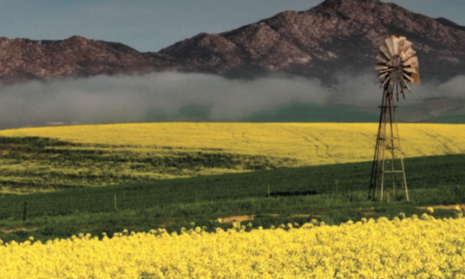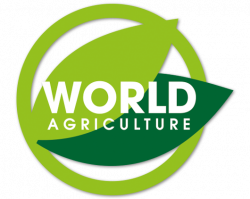Around the world in 80 countries

The world faces global agricultural problems with a rising human population, increased consumption per capita and climate change. The growth in agricultural yields during the 20th century was associated with intensive experimentation, that should continue, and increased fossil fuel use that should not. Agriculture has been a net producer of greenhouse gases, whereas forested areas, acting as a major carbon sink are being destroyed to be replaced by agricultural crops and an increased urban sprawl. Food production needs to increase without increasing greenhouse gas output. The production should be adequate to accommodate both a population increase and overcome an existing under-nourishment of millions, associated with poor immunity to infection and high neonatal mortality. The roles of food storage, distribution and economics are a vital part of this problem.
We invite individuals to make literary contributions to World Agriculture (see Directions to Contributors, this Issue). The journal has the unique purpose of interpreting scientific and economic information for non-professionals and giving unbiased, objective, independent assessments of ways forward. This will be achieved through the words of many authoritative individuals who have examined specific problems in detail. These assessments should provide some guidance to decision-makers who can be individual farmers, regional advisors or national and international policy makers and many others.
It is our plan that the journal will be available to people “on the ground” in both developing and “western” countries – in a minimum of eighty countries. The objective interpretations will be in plain language, so that they are comprehensible to individuals who do not have scientific or economic training. All literary contributions will be carefully reviewed before acceptance or rejection, as the reliability of our statements is of utmost importance. The criteria we adopt in reviewing differ for each section of the journal. The sections are:
Editorials, Scientific; Economic & Social; Opinion & Comment; Letters to the Editor and Book Reviews
Individuals with well-established opinions will be invited to state their case in our Opinion & Comment columns. With important developments, e.g. GMs, our aim, as a completely independent journal, will be to give a balanced assessment of their value in specific situations, as opposed to the broad generalisations of protagonists and antagonists that have little value to an end-user. For the sake of brevity in the modern world there are too many such unjustifiable generalisations, where the truth often lies in the detail.
Some of the areas of interest over which we intend to provide reviews and assessments are:
(1) Development of Agricultural infrastructure of developing countries and the relationship of those countries to world economies.
(2) Technological innovation in developing countries.
(3) Subsidies, world trade and food production.
(4) Biofuels – the net value of different types, effects on food production, carbon balance and their economic worth v. fossil fuels.
(5) Agro-forestry.
(6) Genetic modification (GM) of crops and animals?
(7) Organic food production-what is it?
(8) Fish farming, its role in developing & developed countries.
(9) The effect of climate on oceanic food chains and wild fish stocks.
(10) The effect of agriculture & forestry on the greenhouse gas cycle.
(11) Transmissible disease control in crops and animals and of zoonotic diseases.
(12) The different roles of livestock farming in developing & developed countries.
(13) The importance of a diverse world ecology and areas of wild life.
(14) Human population growth and migration – its social and economic implications.
(15) Soil erosion, soil quality and as a
carbon sink.
(16) Fresh water scarcity, drainage, storage and flooding.
The complexity of issues we shall cover is exemplified by the expected effects of climate change on world population and agricultural production.
In relation to (10) above: since the industrial revolution there has been a 33 per cent rise in atmospheric CO2 and a 100 per cent rise in atmospheric methane (CH4) (RSC 2005).
Of the total emissions agriculture and land use generally contribute a massive one third. Emissions from deforestation alone account for 18 % of the total according to Stern (2006). The International Institute for Applied Systems Analysis (IIASA, 2006) has calculated that mitigation of greenhouse gas emissions would save $15 to $20 billion annually on irrigation requirements alone, by 2080.
In respect of (15) above: research must determine how carbon storage in soils is to be enhanced, complementing the need to understand emission rates from soils. Higher temperatures cause plants and soils to soak up less carbon (C) from the atmosphere and cause perma-frost to thaw, potentially releasing large quantities of CH4. Methane emissions have increased by 60% in northern Siberia since 1975 (CH4 emissions represent 15% of total CO2e1 emissions. Perma-frost and wetlands respectively store 1500 and 1600 billion tonnes of CO2e, according to the Stern Review). Investigations of feedbacks in the natural C cycle will explore how warming affects the rate of absorption of CO2 and CH4 by forests and soils. Whether warming also accelerates liberation of CO2 from oceans is influenced by the carbonate reaction with an acidifying effect.
Under (16): develop new drought & flood resistant crops and develop new crops and varieties of existing crops that both reduce emissions and have higher yields. These developments can be implemented most rapidly by use of proven genetic manipulations (including, so-called GM) and related techniques.
Warming is very likely to intensify the water cycle, reinforcing existing patterns of water scarcity and abundance – increasing the likelihood of droughts and floods – the fraction of land area subjected to intense drought at any one time is likely to increase from 1% to 30% by 2100, according to Stern. Currently about 18% of cultivated land is under irrigation, accounting for 70% of total anthropogenic use of renewable water resources in the year 2000. IIASA calculate that from 2000 to 2080 world-wide irrigation requirements will have increased from 2630 billion m3 to 3280 billion m3 and that unmitigated climate change would increase this need by a further 400 billion m3 annually. Already 1.7 billion people live in countries experiencing water stress and this number is set to rise to 5 billion by 2025 according to the UN. Methods of fresh water conservation need detailed study. Flooding will be caused by excessive rainfall in low-lying areas as well as by sea level rise. Mean sea level rise over several centuries could eventually be 5- 12 m.
This Issue includes papers from authors in Africa, America, Europe and China. We are publishing the first of a series of papers on African agriculture. These deal with both technical and organisational aspects of the subject. A conclusion reached by several contributors is that improvements in the infrastructure of Africa will contribute greatly to agricultural production and to the livelihood of rural communities. With this the development and strengthening of farmers’ groups, so that the many small farmers have access to a larger market for their produce and so that they have access to technical and financial support, will inevitably play vital roles.
The importance of infrastructure and means of communication will become increasingly important in a changing climate. Most predictions indicate that Africa will be subject to marked change. Although a continuous
increase in atmospheric CO2 concentration may have a positive fertilisation effect on crop yields, the expectation is that the net effects on world yields will be negative. Moreover, the disparity between tropical and temperate climate zones and between developed and developing countries is likely to increase, despite a positive impact of crop genetics and other technical innovations. We are told that 45 out of the 49 least developed countries are net food importers. It is essential that these countries have access to the most reliable advice and technical developments. Innovations produced in genetically modified crops and in many other fields must be addressed objectively. The establishment willy- nilly of subsidies for biofuels and of an arbitrary setting by the EU of 10 % as the proportion of all transport fuel that should be derived from biofuels by 2020 is questionable, without a much more detailed examination of the subject. To examine such questions is a function of this Journal.
Models of world climate indicate that the outcome is influenced by a complex array of factors and that the uncertainty of climatic conditions from year to year will increase, so that the frequency of crop failures is likely to increase. This conclusion places even greater importance on the infrastructure and means of communication amongst African countries, allowing crop failures in one country to be replaced by produce from another, so that food storage from one year can be held safe from predation by pests for the next and so that excess rainfall in one year, or in one month, can be conserved for the next. It is our intention that this Journal provides an assessment of the evidence and of alternative solutions for both producers and policy makers and makes the general public aware of some of the issues involved in the development of world agriculture and related subjects.
Download pdf
